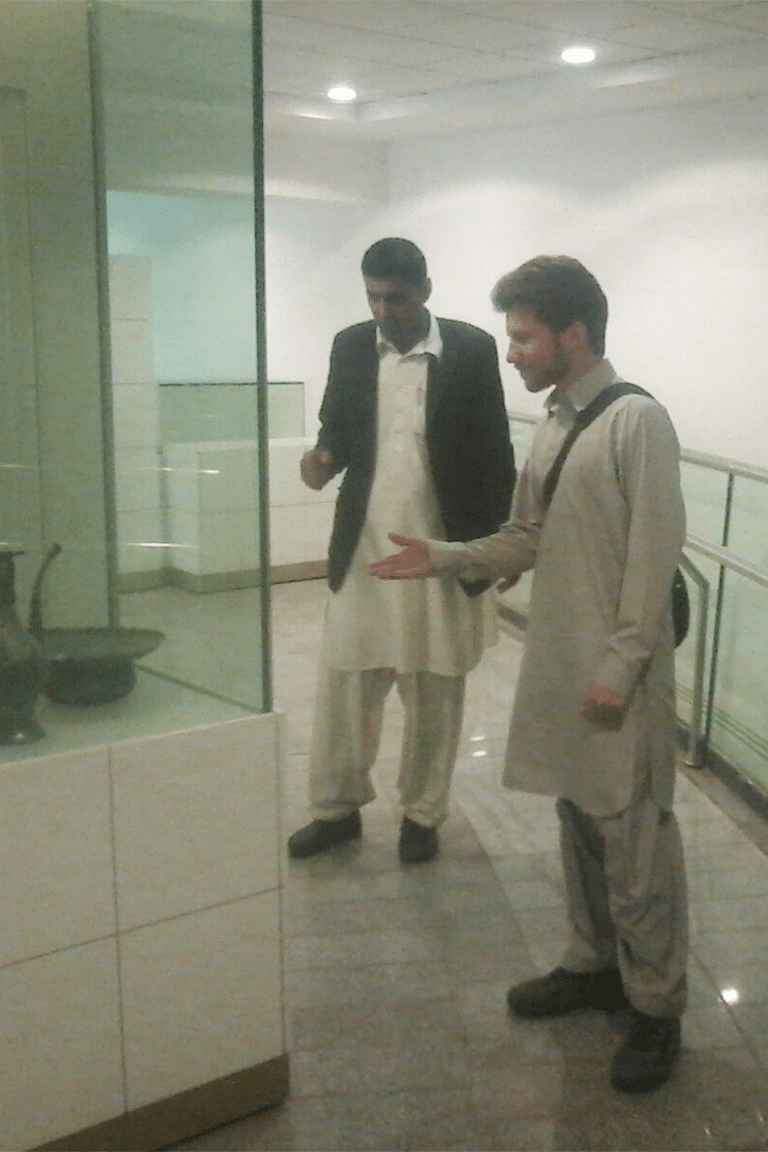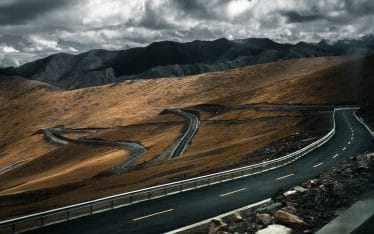Zahedan, the last city of Iran
Entering Zahedan isn’t different from arriving in any other Iranian city – at least at first. Aligned on the side of the highway, there are the familiar portraits of war martyrs, the traditional giant poster of Ayatollah Khomeini, and an intriguing wrecked car throning on a pedestal at the entrance of the city, to entice people to slow down. But seeing a tank on top of a truck convoy, entering the city at an alarming speed, I understood this place was like no other city I’ve been before. In fact, Zahedan is hardly Iran anymore. It is Balochistan.
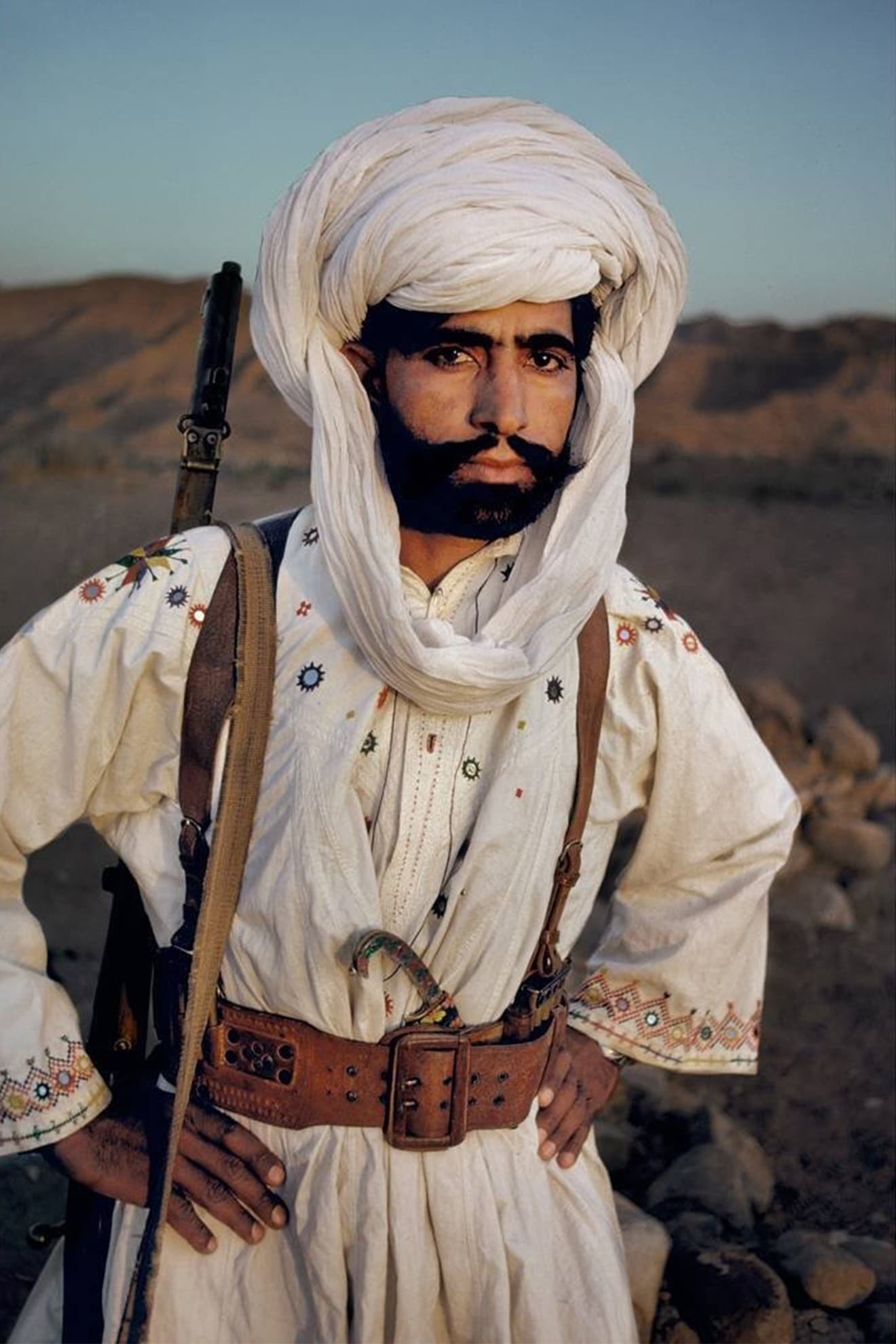
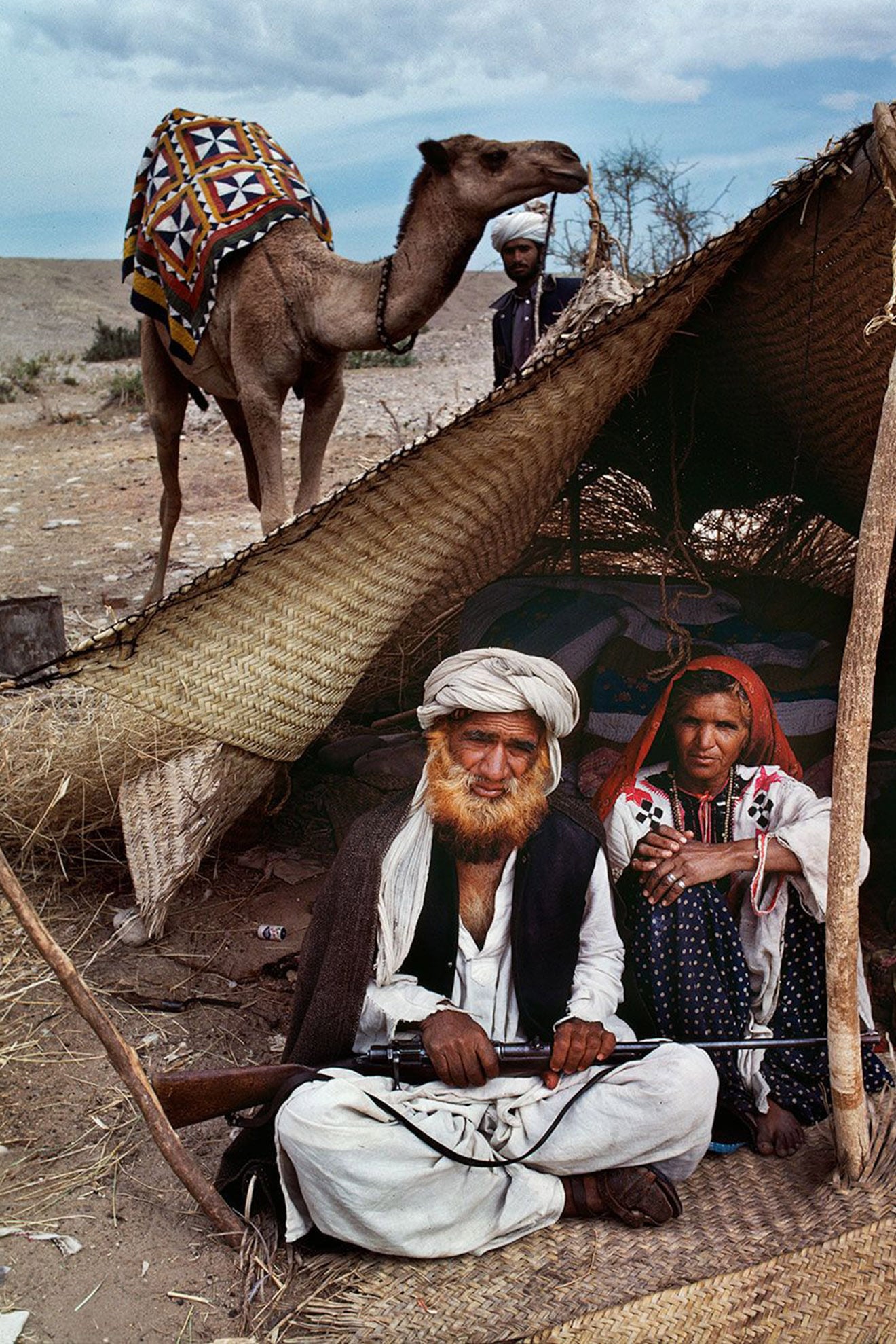
The Balochi people are a distinct ethnic group which has been living on the eastern part of the Iranian plateau for hundreds of years. Throughout history, their lands have been occupied and fought over by large empires and invaders. Be it Alexander the Great, the various Persian Empires, Seljuk Turks, the Mughals, or the British, they’ve seen it all. Nowadays, the region is politically divided between Iran, Pakistan, and Afghanistan. In Iran, they live within the Sistán-Baluchistán region and compose about half of the province’s population, the other half being Persian Iranians.
The Balochi are Sunni Muslims in a country which is overwhelmingly Shiah. They have their own culture and language and many still remain hostile to the state of Iran. The region has been the theatre of conflicts and insurgencies for decades, and is also stricken by drug trafficking coming from the nearby Afghan and Pakistani borders. To this day it remains the most impoverished province of Iran.
“Every man and his dog smokes opium in Zahedan.”
In Zahedan, I am hosted by Ahmed, a Persian Iranian dental technician who welcomes many overlanding travelers on their way to Pakistan. True to Iranian hospitality, he offers me a space to sleep in his workshop, amidst strange machines, syringes, and dental molds. He also invites me to smoke opium with him, as part of his after-work evening ritual. According to Ahmed, every man and his dog smokes opium in Zahedan. It is literally everywhere and easy to acquire. Because the roads are heavily controlled by the police, it is said that smugglers from Afghanistan and Pakistan hide their merchandise inside stitched camels’ humps. The herd is sent to cross the desert for several days and the traffickers on the other side of the border just have to take delivery. The new silk road of drugs…
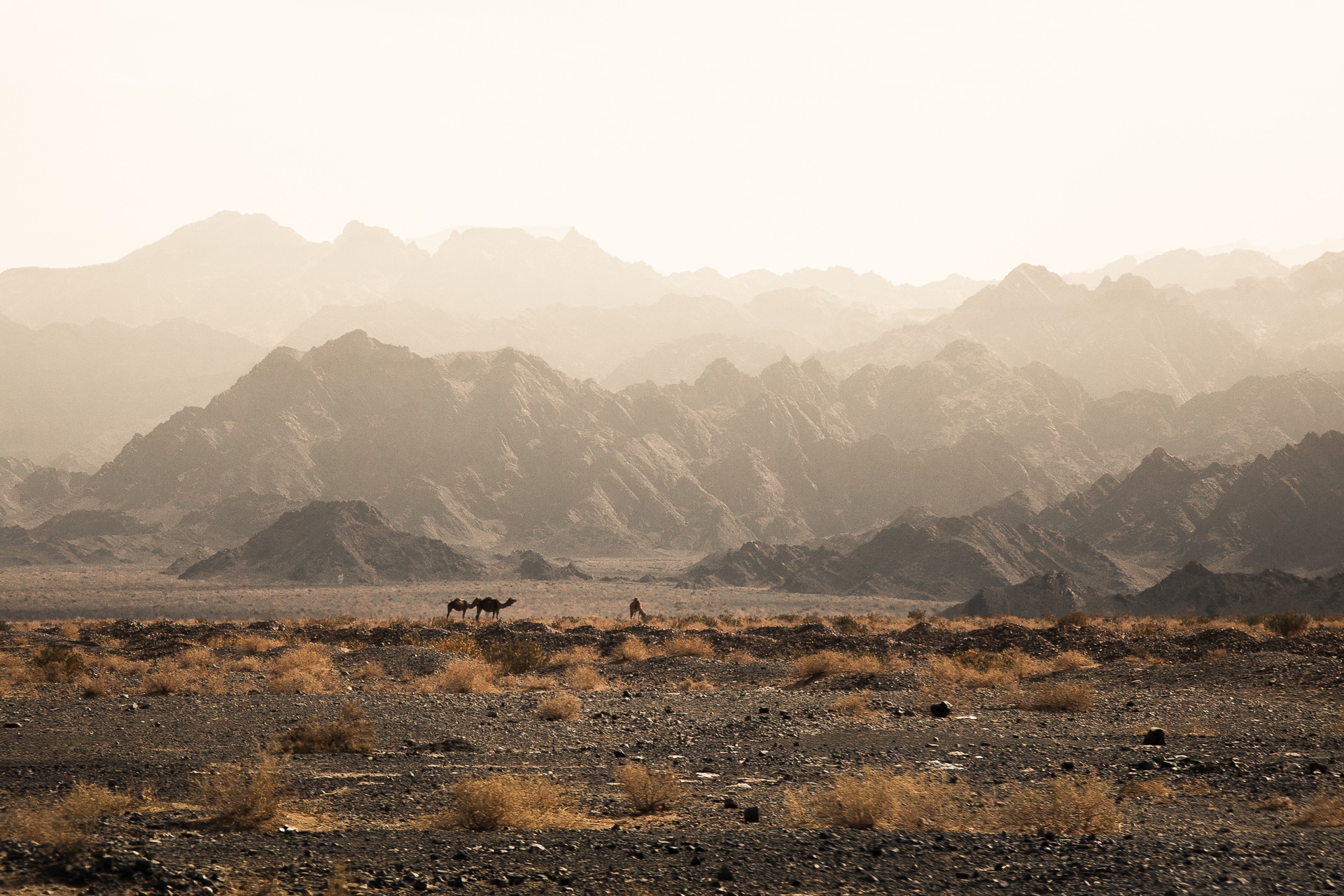
Ahmed takes me to visit several spots in Zahedan, including the Sunday open air market, which takes place on a vast vacant lot. Stalls of fruits, vegetables, and clothes are spread out chaotically across the rugged terrain. You can buy anything you need, and everything you don’t need. The most striking example to me being those little chicks painted in different colors sold solely for children’s amusement!
On Ahmed’s advice, I decide to buy the traditional Balochi outfit consisting of a sharwal (long baggy pants) and a kameez (a long shirt). He believes it will help me pass unnoticed and draw sympathy from the Baloch people in Pakistan. I found it very comfortable and decided to wear it during my passage to the border. If you don’t know what to wear, just dress like the locals!
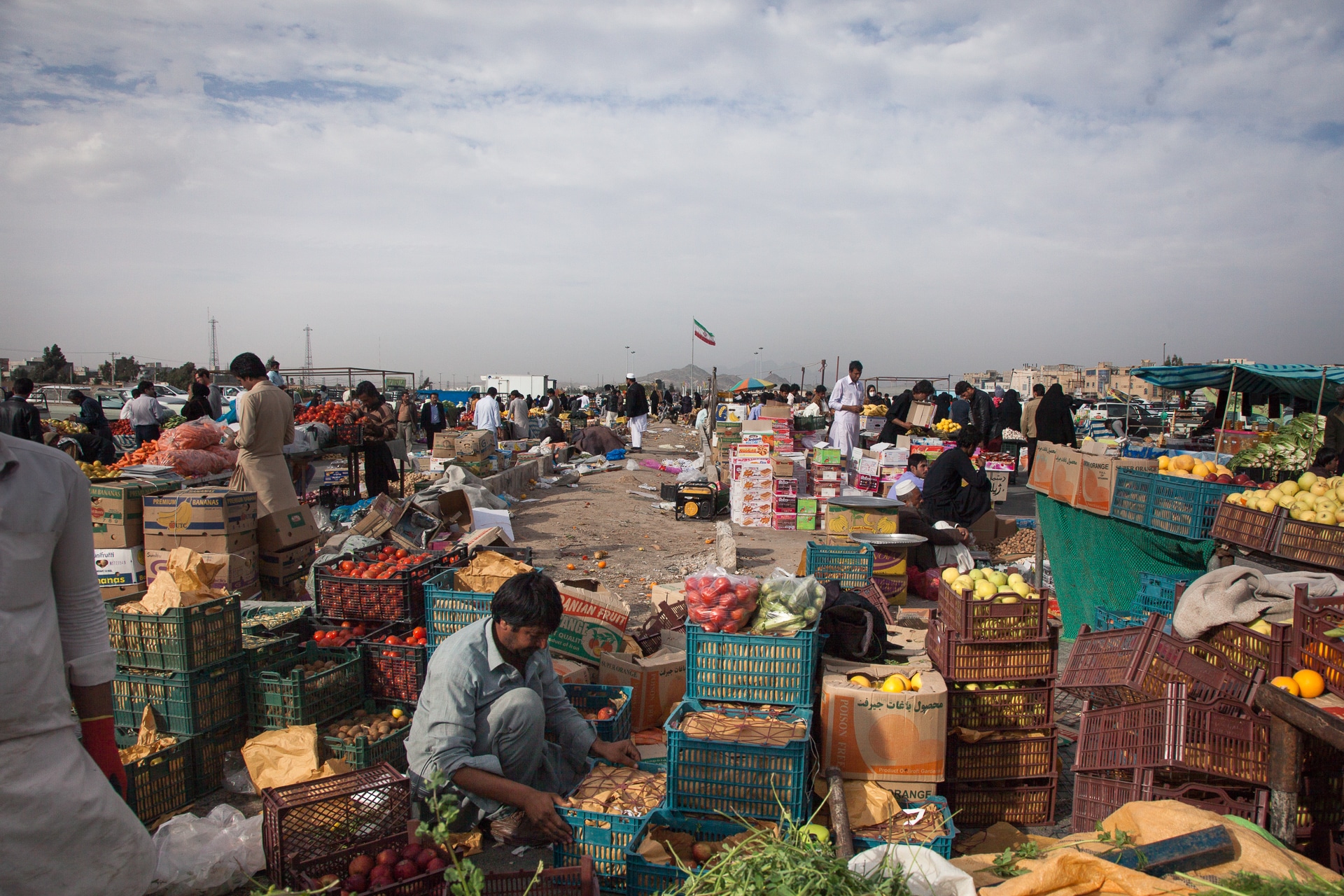
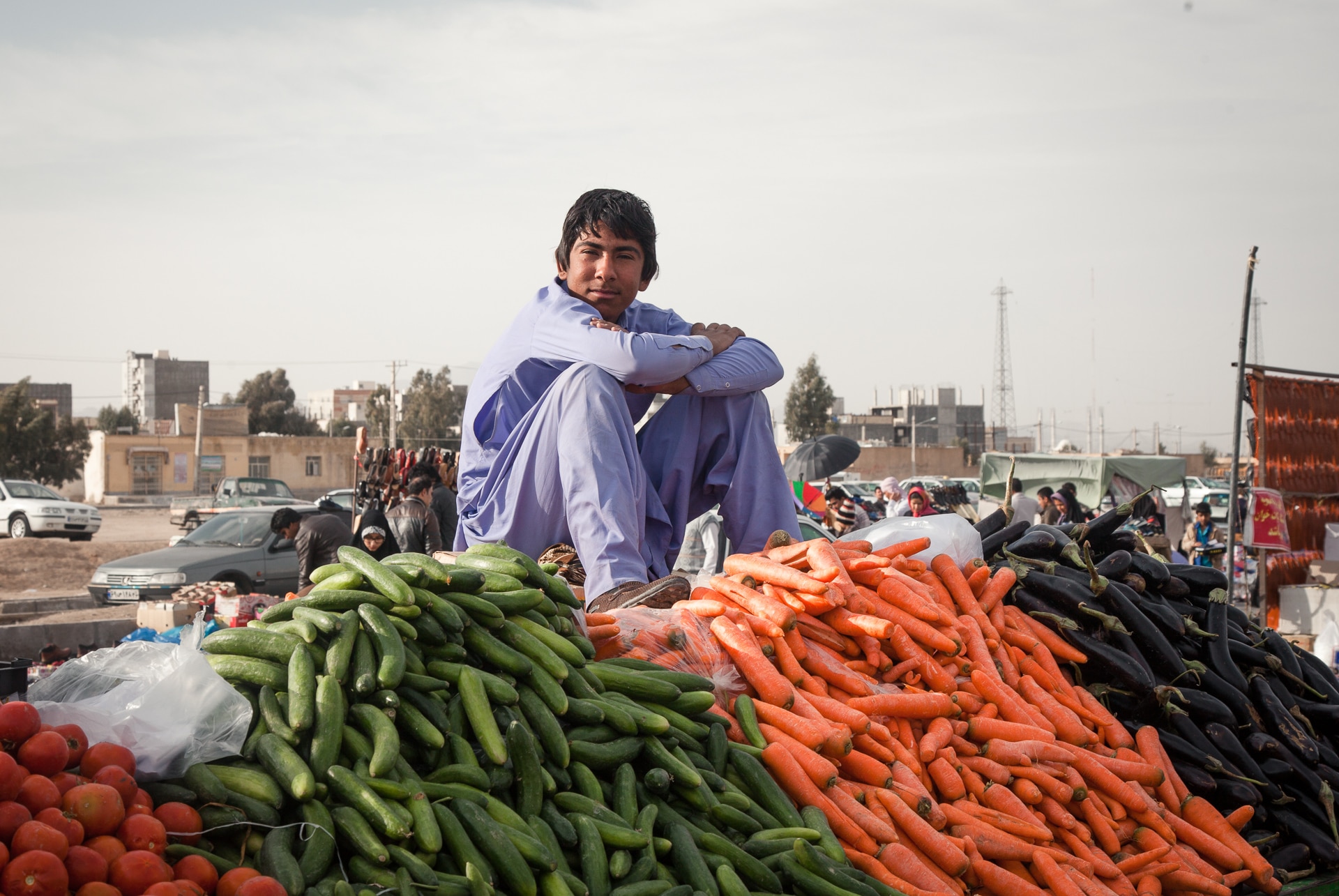
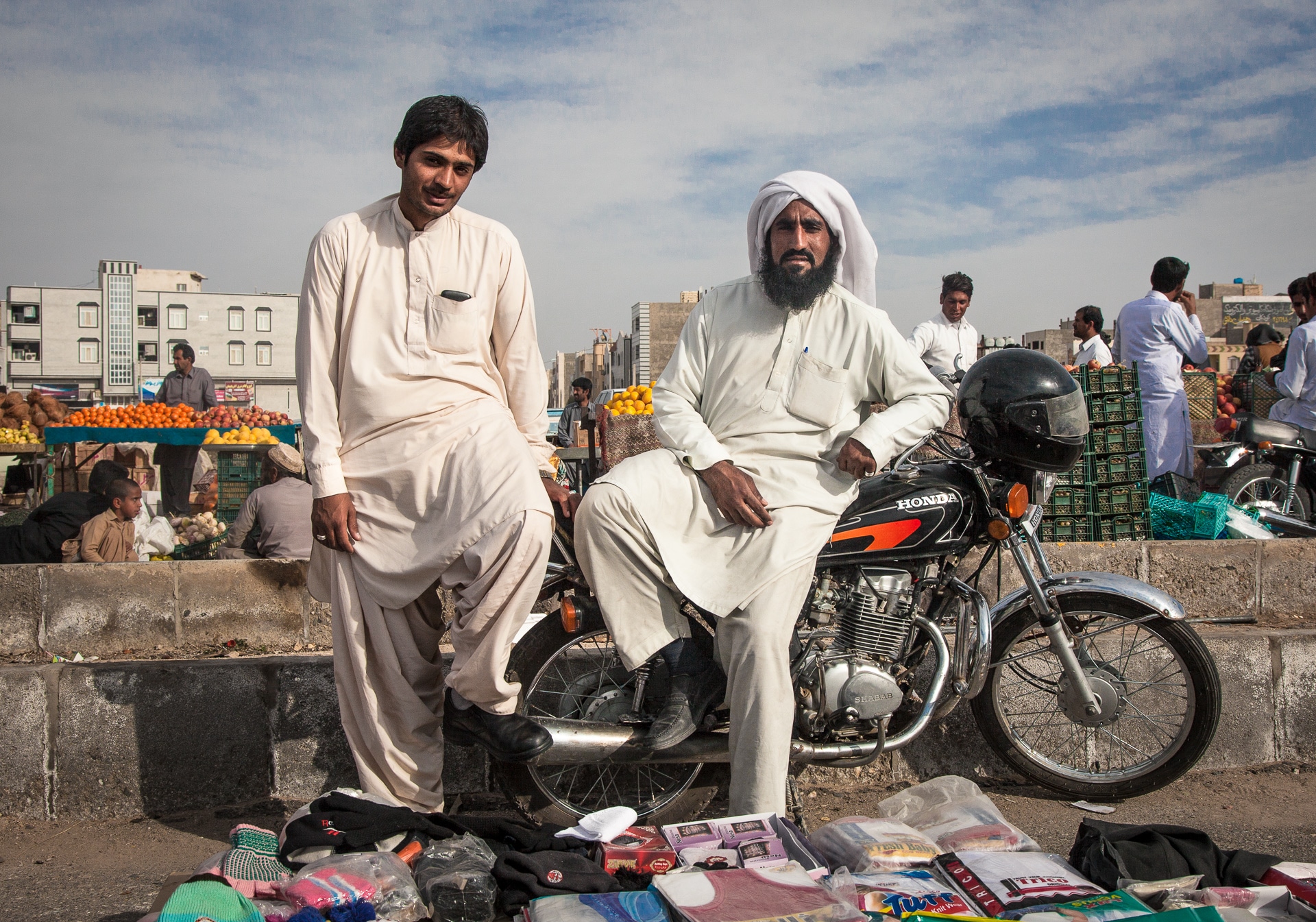
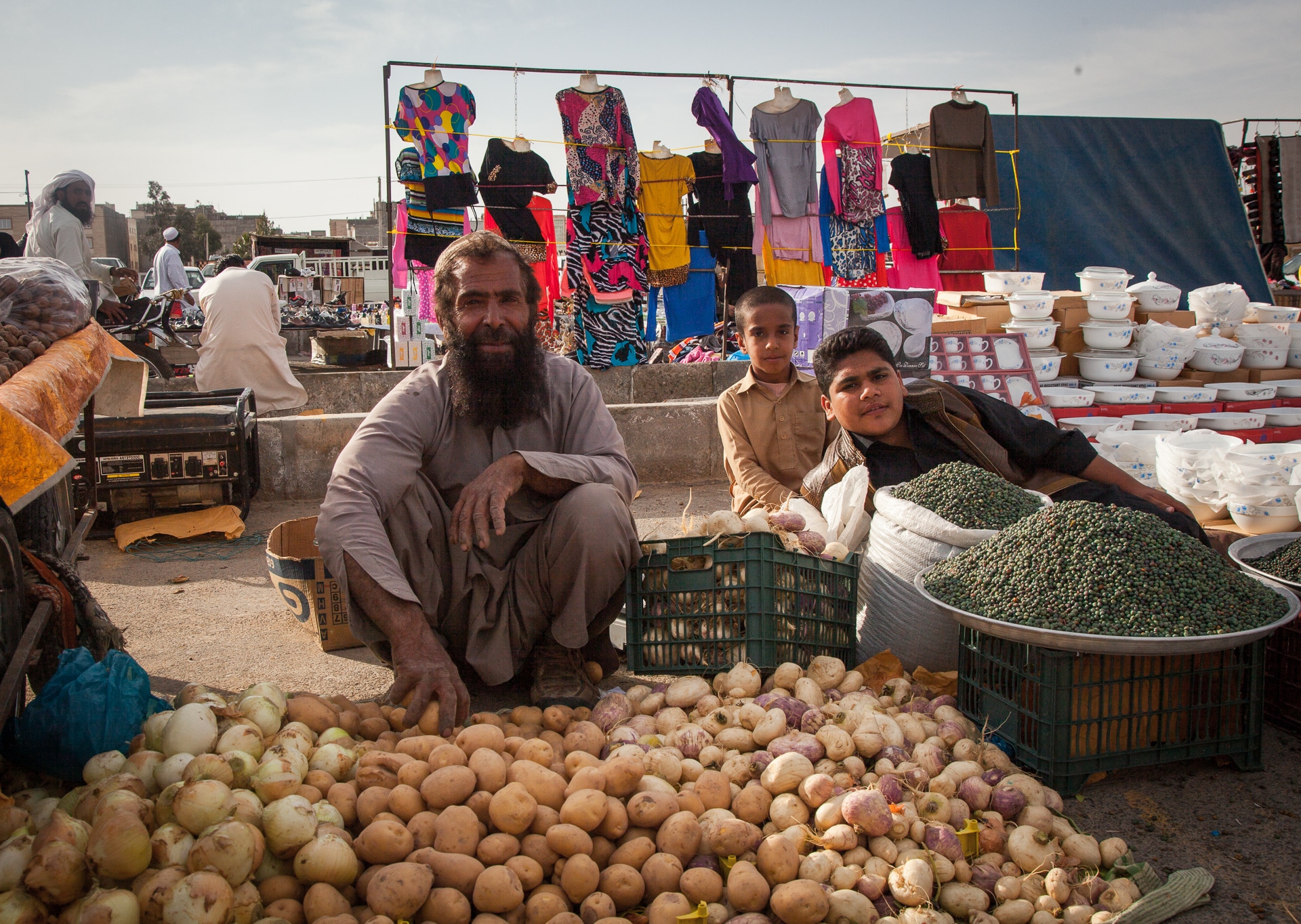
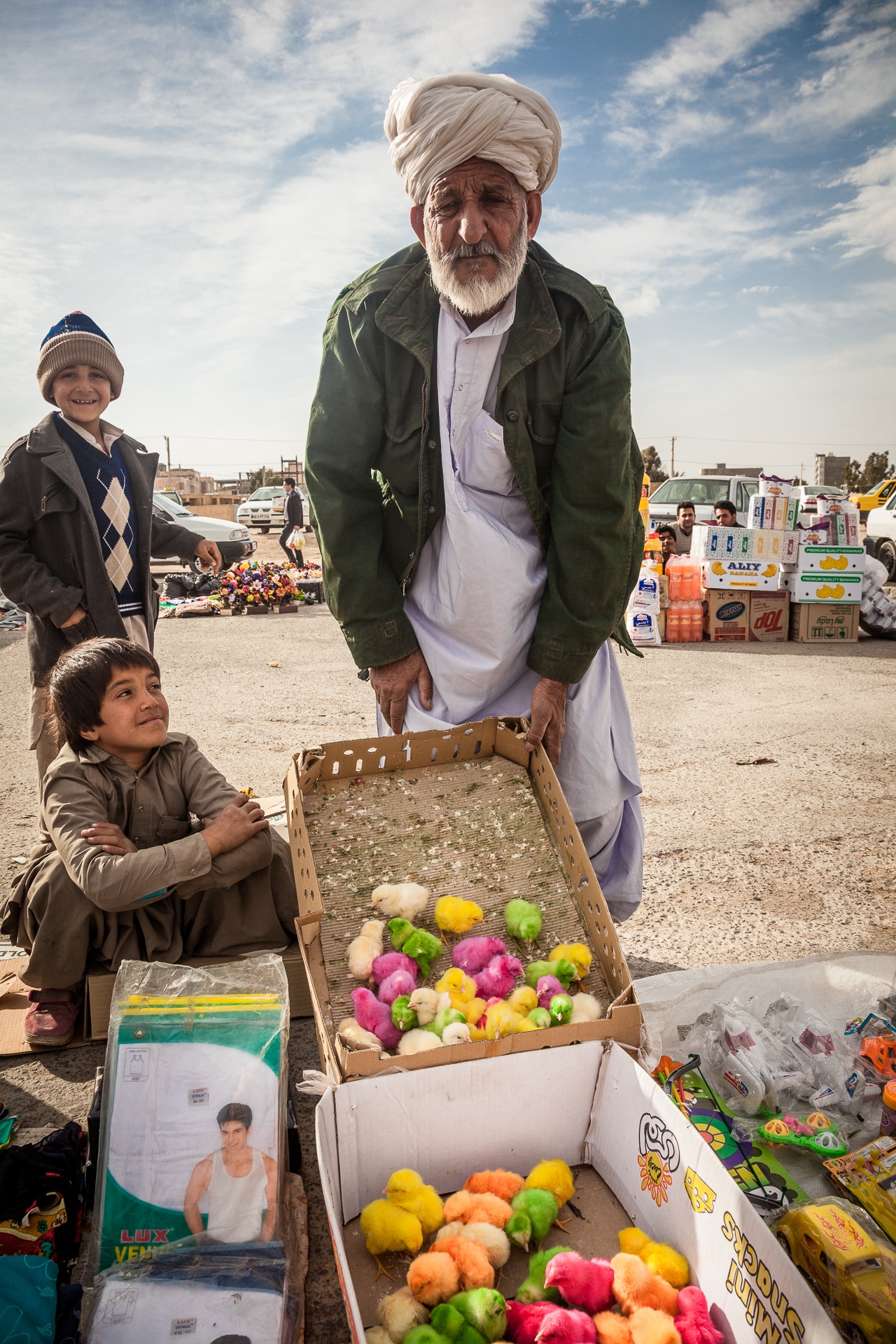
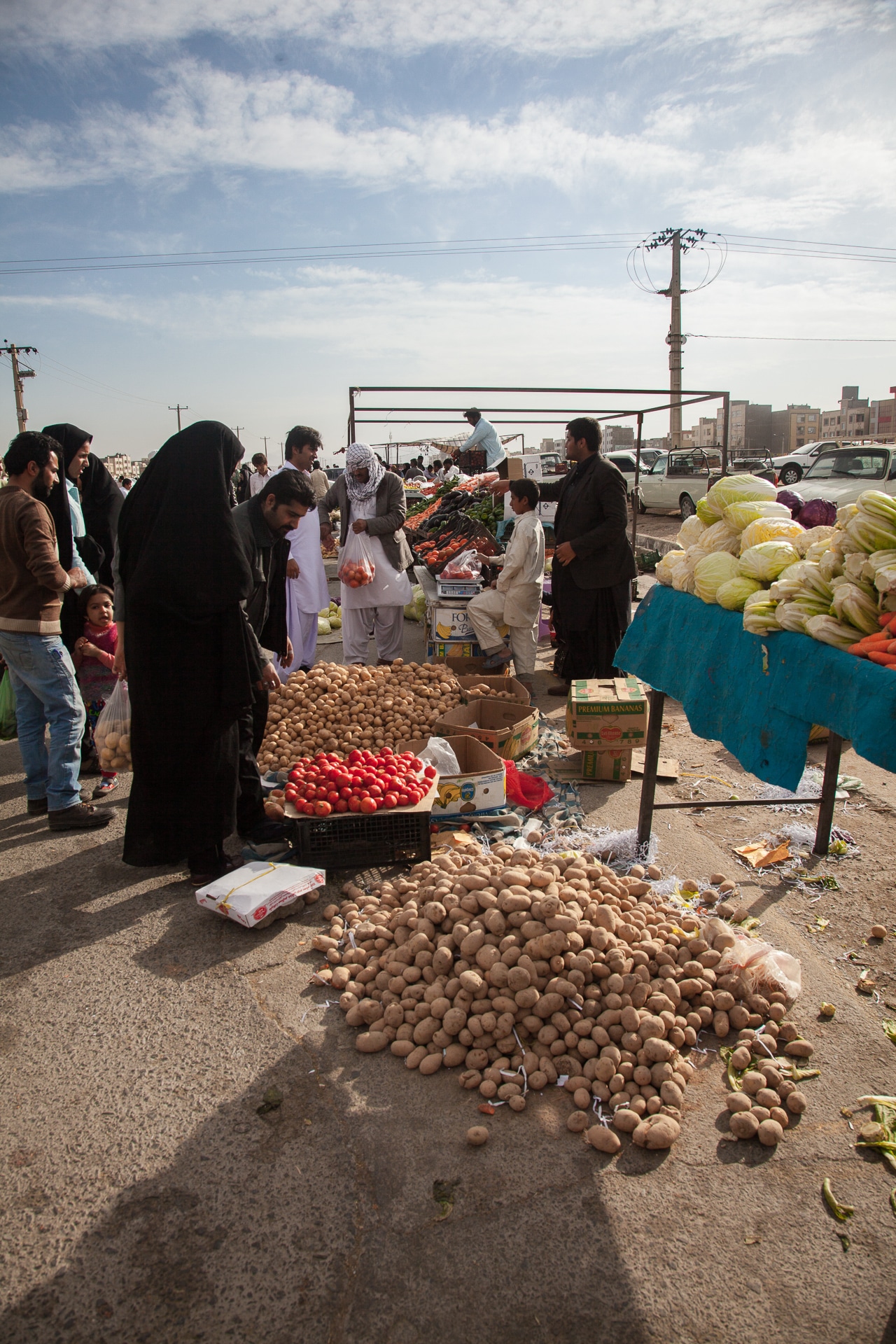
Ready to go to Pakistan
After spending a few days in Zahedan, it was now time for me to head to Pakistan. I had only one day left to cross the border, as my visa had a “Enter before” limit date which was about to expire. This was quite risky: if I didn’t manage to enter Pakistan in time, I wouldn’t be able to get another visa (as Pakistani visas can only be obtained from one’s home country, and I had gotten mine in advance before leaving France), which would mean the end of my overland journey. So on the 25th of January, dressed in my sharwal and kameez, I bid farewell to Ahmed and hopped in a shared taxi to the Taftan/Mirjaveh border.
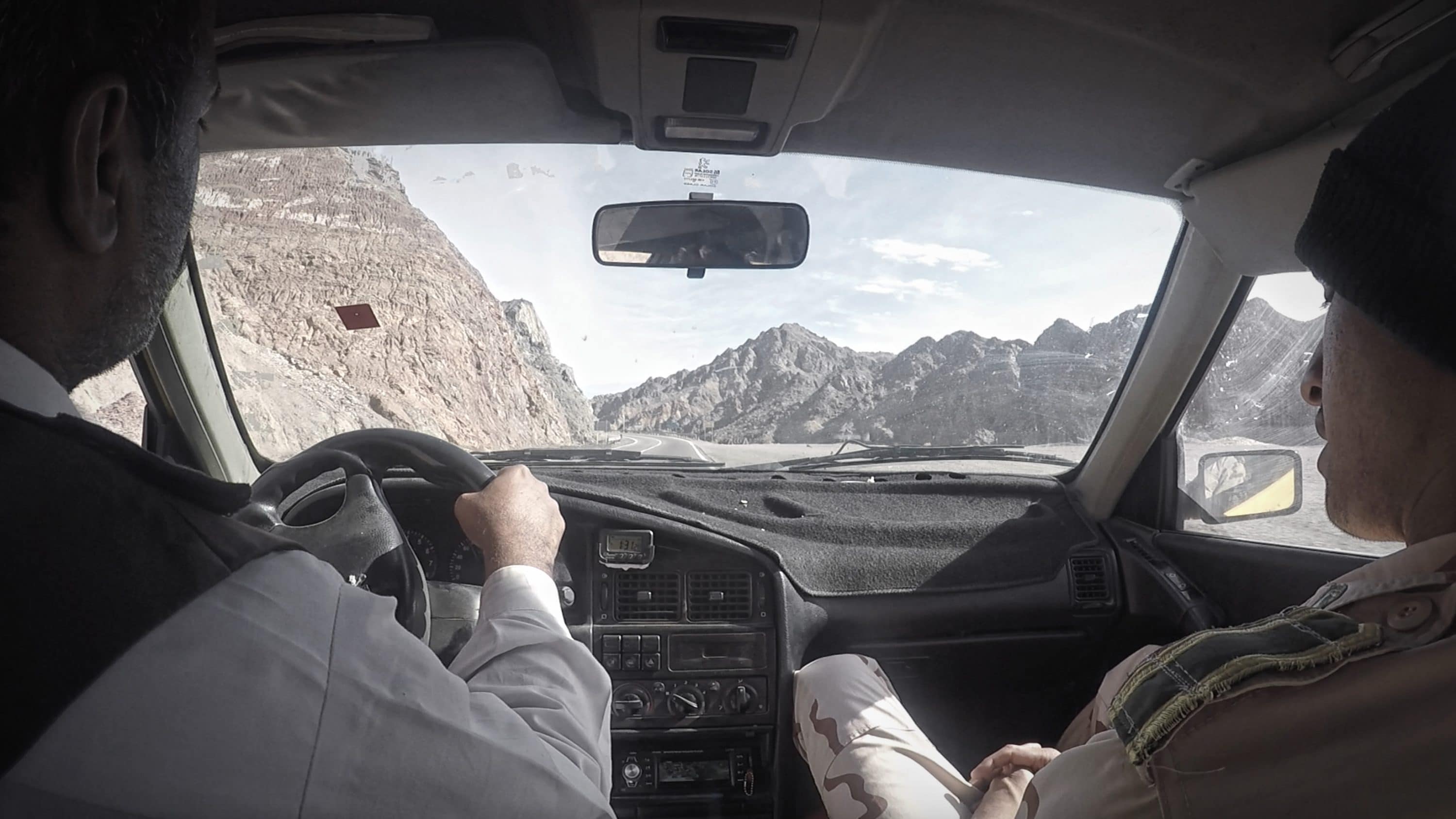
The taxi driver was a typical Baloch man, bulky, mustached, and temperamental. As I got in the car, he was already in a lively conversation with a young Iranian soldier sitting next to him. As for my neighbors at the back, they dozed off as soon as the car started. I peeked out of the window, watching the distant mountains slowly reveal their presence through the desert haze. Pakistan. Here I come.
We progressed into dramatic desertic and mountainous landscapes for about an hour, passing by a few military checkpoints on the way without even slowing down. But at the next one, our car was stopped.
A man came forth and knocked twice on the hood of the car. The taxi driver rolled down his window. From the back passenger seat I couldn’t see the man’s face, only a beige military uniform and a hand reaching out.
« Passports. » said the uniform in a barely audible murmur.
All passengers handed their documents. I could see the man’s hands dismissing the Iranian ID’s and then examining my French passport with attention. The uniform suddenly bent down and the man’s face appeared, staring straight at me. It was a cold and inscrutable face. A cap firmly jammed on the top, a three day black stubble, sealed rigid lips, and tinted aviator sunglasses hiding his eyes. The face of a uniform. I was reminded of the bad guy in Cool Hand Luke and found the resemblance amusing – until I remembered what happens to Paul Newman in the movie at the hands of the cruel officer. The man muttered another few words, and the taxi driver instructed me to get out of the car with my bags.
I was told to take all my stuff with me and follow the man to the little office on the side of the road. As I trotted after his boots, I turned around and sent a pleading glance to the taxi driver. Please don’t leave without me!
A SILENT INTERROGATION
The search begins
The « office » was as minimal as it could be. The room was empty, and was clearly not for administrative purposes. It consisted of a desk and two chairs on each side. An interrogation room, no doubt.
The man pulled the chair facing the desk to the other end of the room and gestured me to sit. I complied. It was not the first time I was searched on my trip, I was not too worried yet. Calmly and politely, I began explaining in English the reason of my presence here. It was useless. The man didn’t respond as he seemingly didn’t care understanding or even listening to me, and was already busy unpacking my bag on the desk. He was going to find out about me his own way: by inspecting all my belongings.
Clothes, accessories, objects, books, papers, junk. Everything was taken out of my backpack and thoroughly scrutinized. He had a look at the books I carried, the Omar Khayyam poetry collection which didn’t spark his interest. He flipped the pages of my travel journal, sometimes pausing when there were some names or cities he recognized. And as he silently read my words, I could not perceive any reaction on his face. What is he reading? What is he thinking? I felt exposed and vulnerable. Although he probably couldn’t understand everything he read, he was intruding my thoughts, my memories, my privacy. But it was about to get worse.
When he was done with my personal items, he confiscated my phone, laptop, and camera. It now clearly appeared that this was not a harmless routine check. The man was determined to find something incriminating about me. And this is when I started to seriously worry about the outcome of this interrogation. Because I had, in fact, slightly compromising evidence which could cause me a lot of trouble.
An American spy?
I happen to have both French and US citizenship. It’s a great chance as I grew up with two cultures and the chance to travel in many countries in the world. But let’s be honest, in some parts of the world being American is not an advantage. In Iran for example, citizens from the USA cannot travel freely and must be accompanied by a guide at all time. I obviously didn’t want that, so I used my French passport and concealed the fact I had another nationality. I hid my American passport in a pocket at the bottom of my backpack, hoping it would not be discovered during my time in Iran.
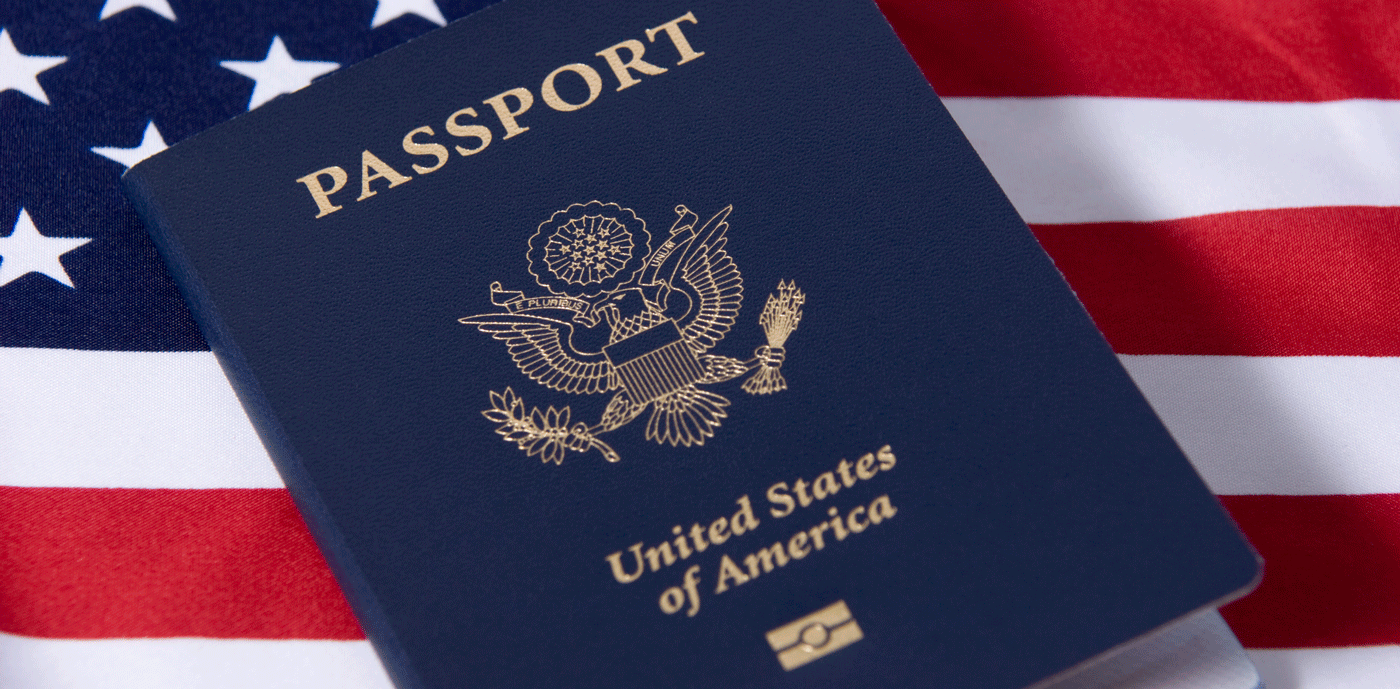
As I sat mortified on my chair, my passport was for the moment still safely hidden inside my bag, perched on the desk between the man and I. If he were to find it, I knew the interrogation would reach another level, and I could be found guilty of concealing my US citizenship. Awful stories of American tourists being detained and accused of spying for the US government came to my mind. I was facing a very real possibility of spending the night in jail.
Or a drug trafficker?
The other compromising piece of evidence was in his hands. My camera.
My camera is my eye, and I capture every experience I can. Some experiences are not always entirely legal. Such as visiting an underground alcohol distillery in Kerman (alcohol is prohibited for Muslims in Iran) where I met the Iranian Walter White/Heisenberg producing his own home made beer, wine, and whiskey in his basement. There’s a picture of him and I toasting with glasses of Shiraz wine in our hands, watching « Iran got Talent » (a prohibited show in Iran, aired from Dubai and streamed on alternative channels). This guy also imports forbidden foreign products, such as Israeli delicacies. How much jail time would he face if he got caught because of me?
But that photo was probably harmless, I thought. The glass of wine could be a glass of grape juice as far as the officer knew. However I had other pictures which were more explicit in their reprehensible nature. A few days earlier, I went on a desert trip with two Iranian friends. They had opium with them, and I naively decided to document the whole smoking process. Resulting in 3 or 4 photos of them joyously inhaling the opium fumes, all of which were still viewable in my camera.
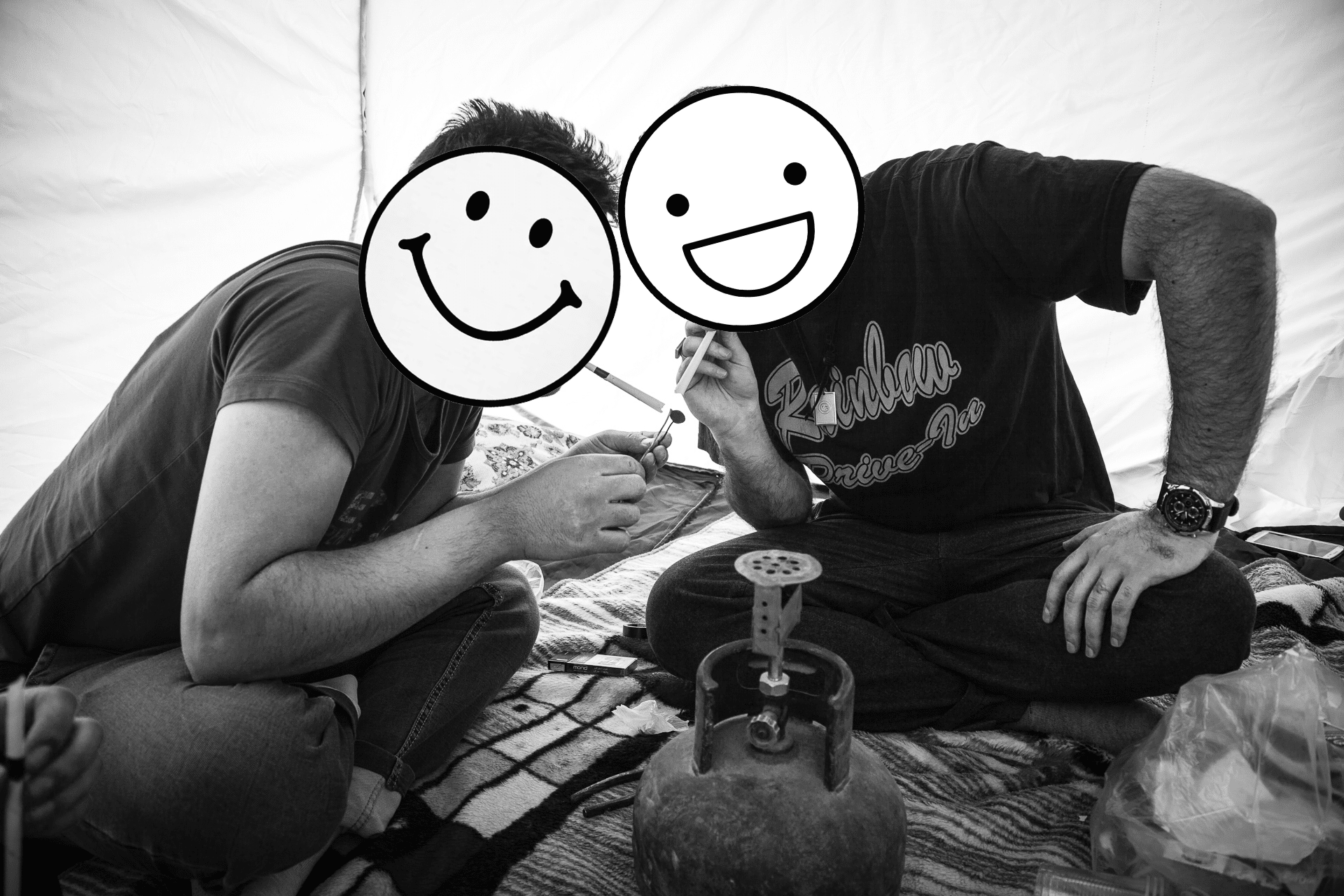
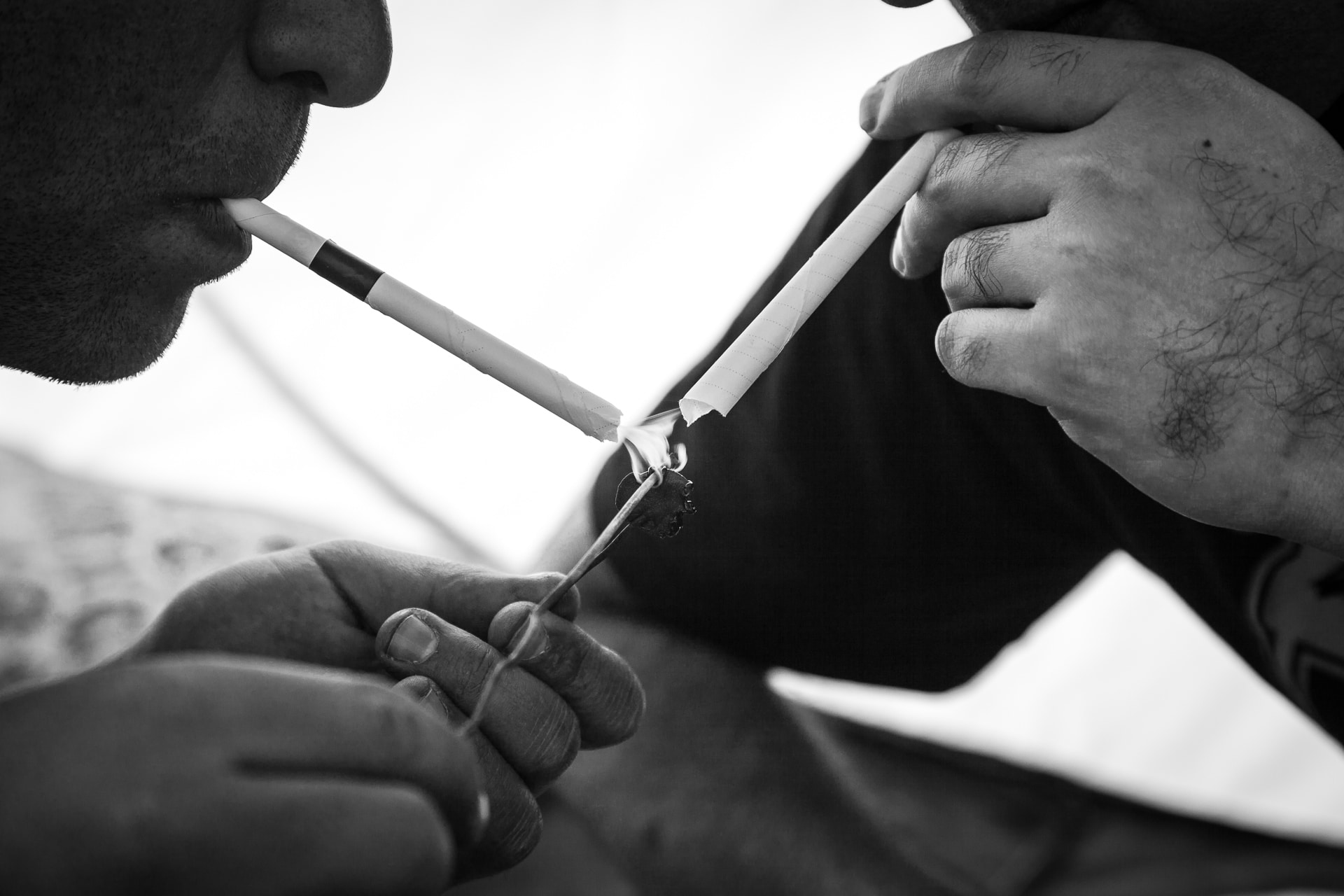
The man went through the photos, his head bent down on the LCD screen. I tried to read his face from the other side of the room, anticipating the flinch, the smirk, or the eyebrow raise which would signal he had found the pictures.
But the man’s face remained devoid of any grimace and he eventually put the camera back on the desk. Luckily for me, he didn’t find anything satisfying. Did he accidentally skip those photos? Or did he actually see them and couldn’t care less? After all as Ahmed say, every man and his dog smokes opium in this land…
“The man with no eyes” from Cool Hand Luke.
The close shave
The man seemed to be done examining my belongings and items. I had been containing all my distress and anguish inside, trying to retain any sign of nerviosity. When he put the camera back in its case, I allowed myself to discreetly sigh in relief. He didn’t find anything, I’m gonna be fine!
I was wrong. Just as I thought this whole circus was over, the man stood up from his chair and approached the desk, towering over my backpack. He began opening different pockets and pouches, his hands creeping in every corner of the bag. The American passport was hidden inside my backpack, at the very bottom. And that’s exactly where his hands were now reaching. He would find it in a matter of seconds. My heart was beating furiously. I became livid. This is it, I’m screwed.
BAM! The door slammed open, and a loud babbling voice entered the room. It was the mustached taxi driver, who burst inside yelling relentlessly to the man in uniform. I had lost track of time by then, but I now realized the cab and all the other passengers had been waiting for quite some time outside. The two men argued. Completely baffled by what was happening, I sat speechless on my chair whilst a face-off ensued in front of me. The frantic Baloch quickly took the advantage over the tempered Iranian officer: “We are late! The border is going to close soon and I’m losing money and time, let us go!” is what I understood from his impatient tone and frenetic gestures.
The man in uniform turned to me and gave me a nod: “Go”. I stood up without delay and rushed to the desk to repack my bag before he’d change his mind. The taxi driver was waiting arms crossed by the doorway, a defiant and proud expression on his face. And as I shoved my stuff back into my backpack in a hurry, I smiled. The taxi driver hadn’t come to rescue me, I’m sure he couldn’t care less what would become of me. But by fearlessly challenging a representative of Iranian authorities, maybe honoring a higher cause in the name of the Baloch people, he had saved me.
To the border ... and new adventures
Before I left the office, the Iranian officer spoke to me in English for the first time. “Have a good trip” he muttered with a slight smile. Was he actually able to speak English this whole time? And was there in fact a kind man behind this enigmatic face? I didn’t really want to know to be honest and followed my mustached hero back to the cab.
I was happy and relieved. We were back on the road, driving towards the border. There’s no way this day can get any crazier than this, I thought. And hearing this, fate chuckled… What I didn’t know was that I’d be spending the night in a prison anyway. What was awaiting me on the other side of the border was beyond any madness I could imagine.
